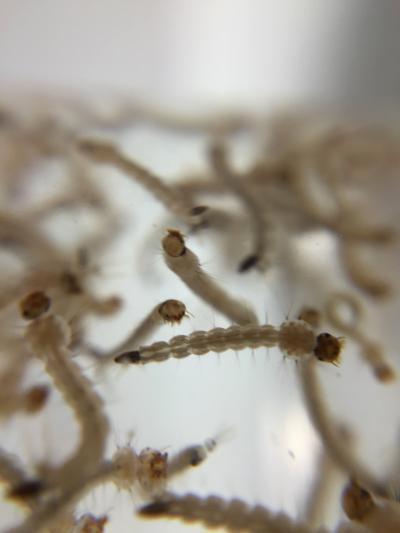
Aedes Aegypti Mosquito larvae
NIAID conducts and supports research to better understand vector biology and behavior and to develop products that can help prevent the spread of vector-borne infectious diseases. NIAID supports research on a wide range of vectors, including mollusks (certain fresh-water snails) and blood-feeding arthropods, such as mosquitoes, ticks, mites, triatomine bugs, and certain flies (including sand flies and tsetse flies).
Vector Biology Program
The NIAID vector biology program supports basic, translational, and clinical research, with the goal of developing products to prevent disease transmission. Basic research activities provide a better understanding of the relationship between the vector and the pathogen and the vector and the vertebrate host, as well as the interaction of the vector with its environment. For example, NIAID is funding an integrative research project to better understand how ticks recognize and suppress infectious disease pathogens and help identify targets for future prevention and treatment options for tickborne diseases. Read more information on the tick immunity project.
NIAID is also funding translational research to support projects to develop novel products and approaches that reduce transmission of vector-borne pathogens to humans. Clinical research helps assess the public health impact of vector control interventions.
Research Efforts
NIAID supports and conducts a wide range of vector-related research.
Vector-Host Interactions Research Effort supports activities to better understand the process of transmission of pathogens via arthropod vectors. As part of this effort, NIAID brings together a multidisciplinary group of investigators from the fields of vector biology, parasite immunology, and human immunology to dissect the complex process of pathogen transmission at the intersection of the human host, the arthropod vector, and the pathogen.
Monitoring Windborne Migration of Disease Vectors, Pathogens, and Pests in Africa to Improve Public Health and Food Securityis committed to establishing a pan-African network of aerial sampling stations to monitor windborne movement of insect disease vectors, disease agents, agriculture pests and their enemies, and keystone species affecting ecosystem stability.
Malaria Research Program seeks fundamental knowledge about the interactions of malaria parasites with the human host and the mosquito vectors that transmit them and to apply this knowledge to prevent disease, enhance health, and improve the quality of life in malaria endemic areas.
Funding
NIAID is always accepting researcher-initiated applications to Parent Funding Opportunities that can be submitted three times per year (see NIH due dates).
NIAID also provides focused funding opportunities specific to vector biology:
- NOT-AI-24-048: Immune Responses to Arthropod Feeding on Vertebrate Hosts
- NOT-AI-23-013: Advancing Research for Tick-Borne Diseases
- NOT-AI-22-074: Targeting the Pathogen within the Arthropod Vector
Connect with NIAID program officers about potential research projects and funding for vector biology research.
- Dr. Adriana Costero-Saint Denis, Vector Biology Program and Clinical Trials for Assessing Vector Interventions
- Dr. Ghiorghis Ghenbot, Translational Vector Control Projects
- Dr. Wolfgang Leitner, Vertebrate Host Basic Immunology, Vertebrate Host Immune Response to Vector Saliva, Vertebrate Host Innate Immunity
Resources for Researchers
NIAID offers resources for researchers to advance basic, preclinical, and clinical research. These include reagents and organisms offered through repositories, such as the BEI resources repository, and genomics, population biology, and bioinformatics databases. NIAID also provides other services designed to facilitate product development and clinical evaluation.
For researchers developing products such as diagnostics, vaccines, or drug therapies, check out Support for Infectious Disease Product Developers.
Connect with other researchers
Search for scientists at NIAID who research vector biology in the scientist directory.
Meetings
NIAID regularly hosts meetings on a range of topics, including those related to vector-host interactions. Read past meeting summaries.
For more information on previous and upcoming workshops related to vector biology, please email Dr. Adriana Costero-Saint Denis.

